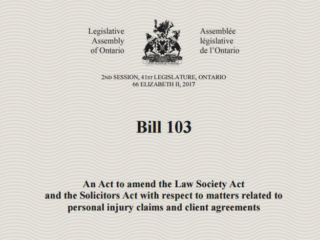Section 44(10) of the Municipal Act, 2001 (the “Act”) mandates that for incidents that occur on municipal sidewalks or roadways, an injured party must provide notification of the incident to the municipality within ten business days, failing which they are disentitled from suing the municipality for their injuries (the claim is “statute-barred”).
However, there is an exception to the 10-day notice period. Section 44(12) of the Act provides:
(12) Failure to give notice or insufficiency of the notice is not a bar to the action if a judge finds that there is reasonable excuse for the want or the insufficiency of the notice and that the municipality is not prejudiced in its defence.
Accordingly, a plaintiff must establish two things in order to overcome a failure to provide timely notice:
1. A reasonable excuse for the delay in providing timely notice; and
2. That the municipality has not been prejudiced in its defence as a result of the delay.
What constitutes a “reasonable excuse” was recently clarified by the court in Graham v. City of Toronto. In deciding that a notice letter that was served nearly three months post-incident did not bar the plaintiff’s claim from proceeding, the court reviewed the factors that may establish a reasonable excuse.
For context, the plaintiff in question sued the City of Toronto with respect to injuries she sustained when she tripped on a large pothole on a pedestrian crosswalk. She tore her right rotator cuff; strained her neck; and injured her right elbow, right arm, and right hand. She required surgery approximately 15 months after the incident and her right arm was completely immobilized for the subsequent 6 weeks. Of note, at the time of the incident, the plaintiff was a managing director at a capital management company. She returned to work immediately after the incident but resigned from this role approximately 18 months later because her surgery, treatment, and recovery time would interfere with her ability to perform her job.
The City of Toronto brought a motion for summary judgment on the basis that the plaintiff failed to comply with the 10-day notice period that was required under s. 42(6) of the City of Toronto Act, 2006, which has identical requirements to s. 44(10) of the Municipal Act, 2001.
The following factors were considered by the Court:
- The plaintiff had a demanding job that required her to work 9:00-6:30, Monday to Friday. She was initially focused on being able to do her job properly, in spite of her injuries;
- It was only after attending physiotherapy consistently for two months without improvement and “continued struggle with being able to perform her job” that she became concerned that her injuries were more serious and would have a continued effect on her life;
- Her recovery was more arduous and lengthier than expected and she did not initially realize that her injuries would have a significant effect on her lifestyle (she didn’t realize until some time had passed that she could not ski or play golf);
- She did not know about the notice requirement; and
- The delay was only three months, which was deemed to be “not significant”.
The Court held that, while none of the above on their own would necessarily amount to a “reasonable excuse,” the combination thereof created a sufficient excuse to justify the plaintiff’s delay. This conclusion was reached in spite of the fact that the plaintiff clearly had capacity to give notice within the 10-day window, and that her doctor had counselled her to file a claim with the City nine days after the incident. The Court accepted the plaintiff’s argument that she did not intend to bring any proceedings until she realized that she would have symptoms for the rest of her life. Most importantly, the Court emphasized that “the plaintiff should not be disadvantaged because rather than immediately decide to sue, she preferred not to if her injuries healed”. The Court also took into account the plaintiff’s explanation that her job was occupying much of her time during the early period of her injury.
Critically, the court held that there was no prejudice to the municipality caused by the late notice. The court supported the proposition that, when there is no prejudice due to the delay, a “modest excuse” may be sufficient.
This decision widens the list of acceptable reasons for late notice. If you have been injured on municipal property, but failed to give notice within 10 days, please do not assume that you cannot proceed with litigation. There are now plenty of arguments that can be put forward to overcome a failure to provide timely notice. It is always best to consult a local personal injury lawyer if one finds themselves in this situation [OTLA Lawyer Directory].












